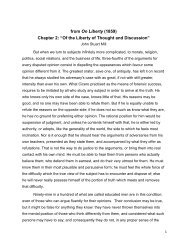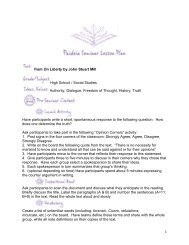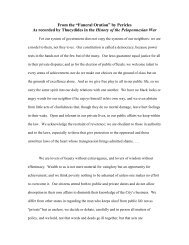Rousseau_contrat-social
Create successful ePaper yourself
Turn your PDF publications into a flip-book with our unique Google optimized e-Paper software.
hastened corruption when once it had begun. The blood of Agis,<br />
slaughtered by these tyrants, was avenged by his successor; the crime<br />
and the punishment of the Ephors alike hastened the destruction of the<br />
republic, and after Cleomenes Sparta ceased to be of any account. Rome<br />
perished in the same way: the excessive power of the tribunes, which<br />
they had usurped by degrees, finally served, with the help of laws made<br />
to secure liberty, as a safeguard for the emperors who destroyed it. As<br />
for the Venetian Council of Ten, it is a tribunal of blood, an object of<br />
horror to patricians and people alike; and, so far from giving a lofty<br />
protection to the laws, it does nothing, now they have become degraded,<br />
but strike in the darkness blows of which no one dare take note.<br />
The tribunate, like the government, grows weak as the number of its<br />
members increases. When the tribunes of the Roman people, who first<br />
numbered only two, and then five, wished to double that number, the<br />
senate let them do so, in the confidence that it could use one to check<br />
another, as indeed it afterwards freely did.<br />
The best method of preventing usurpations by so formidable a body,<br />
though no government has yet made use of it, would be not to make it<br />
permanent, but to regulate the periods during which it should remain in<br />
abeyance. These intervals, which should not be long enough to give<br />
abuses time to grow strong, may be so fixed by law that they can easily<br />
be shortened at need by extraordinary commissions.<br />
This method seems to me to have no disadvantages, because, as I have<br />
said, the tribunate, which forms no part of the constitution, can be<br />
removed without the constitution being affected. It seems to be also<br />
efficacious, because a newly restored magistrate starts not with the<br />
power his predecessor exercised, but with that which the law allows him.<br />
6. THE DICTATORSHIP<br />
THE inflexibility of the laws, which prevents them from adapting<br />
themselves to circumstances, may, in certain cases, render them<br />
disastrous, and make them bring about, at a time of crisis, the ruin of<br />
the State. The order and slowness of the forms they enjoin require a<br />
98











